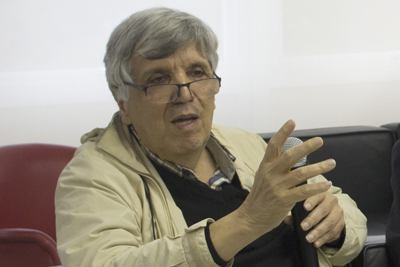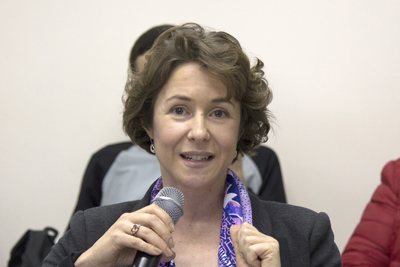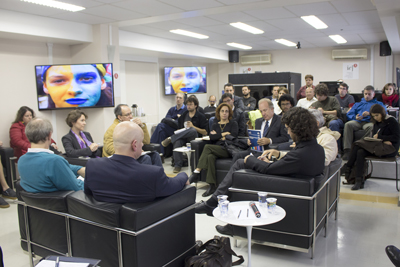Identity-Based Nationalism in Focus
 |
|---|
| Political scientist Álvaro Vasconcelos during the debate The Challenge of Identity-Based Nationalism |
After 30 years of democratic advances around the world, the future of this political regime is threatened by the emergence of what has been defined as “identity-based nationalism,” according to the assessment of Portuguese political scientist Álvaro de Vasconcelos, contributing professor of the Institute of International Relations (IRI) of the University of São Paulo. He spoke on this topic at the debate The Challenge of Identity-Based Nationalism organized by the IEA on June 24.
According to Vasconcelos, the number of democratic countries has increased in recent decades with the “third democratic wave,” a trend that began in Europe in the 1970s, when democracy was established in Portugal, Spain and Greece; hit Latin America in the 1980s, with the end of military dictatorships; reached Central and Eastern Europe in the 1990s; and finally swept through the Middle East and North Africa in 2011, in the revolutionary movement known as “Arab Spring.”
In view of the scope and longevity of this wave, the professor said, it was believed that democracy would continue to expand to other regions. “But we found that the wave stanched; it has stopped flowing since the 2000s,” he said, noting that the Arab Spring did not culminate in the full democratic transition of the countries that joined the revolution.
Vasconcelos cited the study by Larry Diamonds at Stanford University’s Center on Democracy, Development and the Rule of Law, which concluded that there has been since the 2000s a regression of democracy in the world: in the past fifteen years, 25 countries ceased being democratic through coups or retreated from the principles that govern this political regime, as was the case of Turkey.
“Will democracy continue to spread or have we entered a period of crisis and will witness other setbacks in the democratic process?” asked Vasconcelos. Seeking answers to this question, a research group from the IRI, led by him, identified three global megatrends that will determine the future of democracy:
- The emergence of identity-based nationalism in a scenario of increasingly intense migratory transits and advancing multiculturalism.
- The empowerment of citizens, resulting from an ongoing reduction of poverty and the resulting growth of a new global middle class; from the emancipation of women; from improving education rates; and from access to information technology.
- The diffusion of the State’s power to non-governmental institutions, particularly to large economic groups, accompanied by a weakening of nation states and of the power of government.
Organized in partnership with the IRI in the IEA’s Laboratory of Global Megatrends and Challenges to Democracy, the debate began a cycle of three meetings, each related to one of the megatrends identified by the group. The next encounters will tackle The Challenge of Financing of Electoral Campaigns and The Challenge of Participatory Democracy.
In this first meeting, the speakers were Arlene Clemesha, from the School of Philosophy, Literature and Human Sciences (USP) and Leandro Karnal, from the Institute of Philosophy and Human Sciences (Unicamp), in addition to Vasconcelos.
European origins
After presenting the overall theme of the debate cycle with an exposition on World Trends and Challenges to Democracy, Vasconcelos, who founded the Institute for Strategic and International Studies (IEEI) in Lisbon, Portugal, discussed the specific topic of the first encounter by addressing the Challenge of Identity-Based Nationalism in Europe.
He stressed that far-right parties are gaining more and more space in the European continent and promoting the rise of identity-based nationalism, which he defined as the “claim of superiority of one’s nation or one’s community with regard to a particular unique identity, whether racial, cultural, religious or civilizational that is deemed threatened.”
According to him, nationalist parties are growing everywhere in Europe, and are strongest in Italy, France, Greece and the Nordic countries, where they are consistently runners-up in elections. As he observed, “This proves that this event is not connected to the social and economic structure, and has nothing to do with the financial crisis in Southern Europe, because the same trend can be found in the North as well.”
Advocating identity-based policies that not only are exclusory but also promote anti-immigration xenophobic currents, these parties have two key characteristics in common: Islamophobia and anti-multiculturalism.
Islamophobia arises mainly from an essentialist view of Islam, Vasconcelos said. He noted that, more than a merely popular notion, Islamophobia is also based on scholarly explanations by intellectuals who justify the Islamophobic perspective by alleging a fundamental contradiction between Islam and democracy, Islam and reason.
Anti-multiculturalism, in turn, is often accompanied by an anti-globalization sentiment linked to “white nationalism.” According to Vasconcelos, this current sees multiculturalism as a threat to a supposedly superior identity.
For him, the anti-immigration currents at the origin of both Islamophobia and anti-multiculturalism are not the result of the European crisis, as they flourished during the period of economic growth in Europe, particularly through the dissemination of the idea that “immigrants have lots of children and this will lead to an invasion of Europe by the poor.”
He also warned that these identity-based policies are not limited to the right. Islamophobia, for instance, is also a leitmotif of leftist parties, which see Islam as a threat to the secular State and as a synonym of violence, as can be seen in France.
Echoes in the Middle East
 |
|---|
| Arlene Clemesha: “Isis does not represent Islam or speak on its behalf”. |
With regard to the Challenge of Identity-Based Nationalism in the Middle East, Clemesha mentioned specifically the emergence of the Islamic State (Isis) in Iraq and Syria – a fundamentalist and violent group, whose actions seem to be fostering Islamophobia around the world.
According to her, the emergence of Isis is associated with the growth of identity-based nationalism in the Middle East and with a loss of expectations regarding the Arab Spring. In her assessment, the revolutionary movement that erupted in 2011 gave rise to competing explanatory narratives: for some, it would be a new phase of the democratic wave, as Vasconcelos mentioned; for others, it would be the continuation of the 1979 Islamic Revolution in Iran, with Isis taking on the leading role.
When considering this issue, Clemesha defined three types of Islamist groups:
- Reform. Aspire to establish an enduring Islamic State through electoral and democratic practices, carried out within the existing constitutional framework and without the use of violence;
- Radical. Seek to generate uprisings that would enable them to seize power and, toward this end, resort to violent methods, including terrorism against agents of the State.
- Post-Islamists. Advocates of secularism who rose in the aftermath of the Islamic Revolution with a proposed separation of Church and State.
For Clemesha, there are two problems in associating Isis with the Islamic Revolution. First, the revolutionary movement was not originally Islamic, that is, did not aim to establish a theocratic State. And, second, the revolution itself gave rise to an inherently post-Islamic context of internal disputes, characterized by the defense of a secular State.
She criticized the press coverage of Isis, especially when referring to the group as representative of the essence of Islam. “Isis does not represent Islam or speak on its behalf”, she warned.
She argued that although claiming to be the redemption and rebirth of the Islamic State, Isis shares few of the historical characteristics of majority Islam, e.g., by alignment itself with “apocalyptic millenarianism” and by its “non-acceptance of any otherness and diversity.” As evidence of this, she said that Isis does not fit in any Islamist group and differs even from Al Qaeda, because it assumes a sectarian anti-Shiite stance.
In addition to Isis’ actions, she mentioned the position of the Israeli government with regard to Muslim countries as responsible for the upsurge in Islamophobia. “The origin of this is the tendency to differentiate the world and seek quick, easy and exclusionary identification,” she said, noting that structurally this position resembles that of Nazism.
Brazilian identity
 |
|---|
| Leandro Karnal |
Discussing Identity-Based Trends in Brazil, Karnal highlighted the absence of a genuine national identity that defines the country or the Brazilian people. “Having or not having an identity is not a virtue or a flaw that we should resolve with nationalism,” he said.
In his viewpoint, the notion of identity is an essentially European political project associated with 19th century nationalism. It is this project, he said, that underpins French chauvinism, Pan-Slavism, Pan-Germanism, Nazism, and “resulted, in the 20th century, in one of the greatest tragedies humankind ever lived through.”
For him, it is at least curious that the role of identity is re-emerging in an age of globalization, marked by a blurring of identities. “How can Brazil build a concept of identity precisely when one part of Europe is deconstructing it and another part is building it through the idea of xenophobia?”
Due to this context, he warned, discussions on the issue of identity must turn to a question that eludes many: who does the collective national convention serve? “In the 20th century, [the collective national convention] was essentially resurrected by conservative thought, that is, it is the right that resurrected the idea of nation,” he emphasized.
For Karnal, since the Brazilian identity is usually represented by a cultured and traditionally reactionary elite, there is a communication gap between those who represent the national identity – “newspaper producers, magazine makers, TV shows coordinators”– and who the country is in reality.
As an example of this mismatch, Karnal mentioned a truism repeatedly echoed by “an elite that sees itself as the nation’s interpreter, namely, that the people don’t know how to vote.” According to him, this axiom is accompanied by two others, equally biased: “I am not the people” and “I know how to vote.” Ultimately, the idea given out by these intellectuals is that they are not part of the nation,” he stressed.
Karnal concluded his talk with a reflection proposed by anthropologist Marshall Sahlins: “Why does the opening of a McDonald’s in Sicily, Italy, raise the idea that the Sicilians are losing their identity, but the existence of 10,000 Italian restaurants in New York does not represent a threat to American identity?”
Similarly, compared Karnal, why is the habit of white Brazilian children putting on plumes and feathers on Indian Day (April 9) seen as a tribute to the native population, but when indigenous children wear jeans one immediately thinks of acculturation and loss of identity?
“What is the basis for this kind of reasoning? I still believe that the dominant white western, Christian culture is indeed so dominant that nothing can scratch it. So much so that multiculturalism ceases to be a threat,” he concluded.
The debate
 |
|---|
| Speakers and panelists during the debate |
Mediated by Martin Grossmann, director of the IEA, four panelists commented on the expositions by Vasconcelos, Clemesha and Karnal, according to their areas of expertise: economist Marcelo Neri, chief minister of the President’s Office of Strategic Affairs (SAE); psychologist Sylvia Dantas, coordinator of the IEA’s Intercultural Dialogues Research Group; sociologist Félix Sánchez, professor of Social Sciences at PUC-SP; and Geraldo Campos, professor of International Relations at ESPM (Escola Superior de Propaganda e Marketing).
Neri focused on the Brazilian reality by pointing out three major defining characteristics of the national identity. According to him, despite advances in income redistribution in Brazil since 2001, inequality remains a major trait of the country.
The second trait is diversity, which he compared to a melting pot where races and cultures mix. “Brazil is a diverse country, but full of contradictions. The proportion of people who declare themselves black had been falling since 1940, but now the trend reversed. Something is happening in Brazilian society and in the Brazilian psyche,” he said.
The third trait would be what Neri defined as “bipolarity,” which radically estranges left and right in the country. “Surveys show a certain decline in inequality. This has moved tectonic plates and generated earthquakes,” he said.
Dantas prioritized the link between migration, interculturality and identity-based nationalism. For her, the problems associated with the issue of identity arise because humans resort to stereotyping as a way of dealing with their fear of what is different or unknown. The stereotype, she said, provides some psychological comfort in face of the other, who is seen as a threat: “It offers a gratuitous solution that brings with it the idea of belonging, brotherhood, protection from all the anxieties and frustrations of life.”
Ruiz, in turn, brought a new perspective to the debate by talking about identity-based nationalism in the context of Latin America, focusing on the transformations that the continent has undergone since 1999, when Hugo Chavez was elected president of Venezuela.
According to him, Chavez’s election was the starting point of a wave of changes in several Latin American countries, including the victories of Evo Morales, a Native American involved in coca cultivation in Bolivia, and of Rafael Correa, who assumed the Ecuadorian government supported by indigenous movements. Ruiz also mentioned Uruguay, Brazil and Argentina as countries that experienced a shift to the left.
He pointed out that the changes seen in these nations have contributed to “the idea that we’re living a time when politics is being invaded by the poor.” For him, this “refers back to a centuries-old tradition of excluding a very large portion of society.”
Campos, in turn, addressed the general theme of the debate. He began his talk by questioning the very concept of identity-based nationalism. “Has there ever been a nationalism that was not identity-based? Every nationalism is identity-based,” he said.
According to him, the pleonasm is a symptom of two phenomena that arise as a challenge to democracy: the creation of specific mechanisms to produce subjectivities based on purity; and the territorial issue, which is once again becoming central in the political debate.
Photos: Leonor Calasans/IEA-USP
